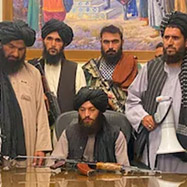Taliban Talks to “International Community”
The choice of words Taliban employs to communicate with the international community is symptomatic not only of the limits of inter-cultural communication, but also depicts how meanings move across geo-cultural spaces and that “right” vocabularies are being used indeed as a qualifier to join the community of nations.
- Medha Bisht
- September 03, 2021










